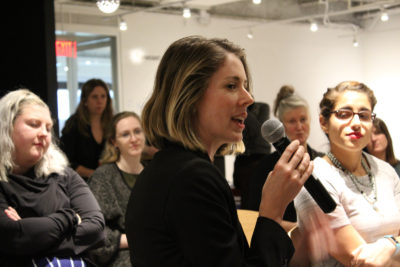
Boston groups Just Us Gals and Ladies Get Paid held a panel discussion to educate women on upcoming equal pay legislation in Massachusetts.
The State of Equal Pay panel brought about 100 people together at the General Assembly Boston Tuesday night, to network and discuss salary negotiations, share stories or their own experiences in the workforce and learn about the Massachusetts Equal Pay Act, which is set to go into effect in July 2018.
“In 2014, the gender pay gap was 80 cents in Massachusetts meaning,” Nina Kimball, co-sponsor of the bill and partner at Kimball Brousseau LLP, said. “We told the legislature ‘Hey, if it’s Friday, we didn’t get paid, because if you earn 80 cents to the dollar that’s only 80 percent pay for the same work.’”
The act has new regulations which make it illegal for a company to use salary history as a baseline for compensation, while also allowing for employees to discuss their salaries and wages with each other, Kimball said.
“It requires us to think more holistically about why do we pay what we pay for each position and it encourages people to think more strategically of what they’re worth,” Lydia Bowers, founder of Dear People Ops, a human resources organization geared towards startups, said.
The legislation adopts the principle of comparable work, a statute that demands salary be determined based on the work and skills of the employee in question instead of being solely based on his or her job title, Bowers said.
“There’s more terminology regarding comparable employment,” Bowers said. “It’s interesting because it pushes companies to think more than just ‘You’re a marketing manager so you get paid the same as any other marketing manager’ and think ‘OK, maybe a marketing manager and an operations manager use similar skills.’”
Learning how to advocate within the workplace and become more assertive was also encouraged by all the panelists. Although the act is a start to closing the wage gap, the bulk of the work rests in changing the culture of the professional environment, Jennifer Irvine, director of marketing and business development at the law firm Bowditch & Dewey LLP, said.
“You’re going to have to speak up for yourself,” Irvine said. “You’re going to have to learn how to negotiate. So, before the raise comes out, understand what’s behind the number, understand how they got to that number. Ask a lot of questions, every question you can think of, ask it and advocate for yourself.”
Several residents said they came out to hear the panel discussion looking for ways to make salary negotiations easier and to learn how to advocate for themselves more effectively within the workplace.
Ashley Banks, 31, of Cambridge, said it’s comforting to know she is not the only one facing these struggles in her field and hearing the perspective of the panelists as well as other women helps with learning how to have these conversations.
“It’s a topic that my friends and I always discuss and that I think we always need guidance on,” Banks said. “I’ve been to a few workshops and I just thought I could use some more guidance on what we could do to make the conversations easier.”
Dominique Bocanegra, 26, of Cambridge, said she came not only to hear stories from other women but also to learn how she could help spread awareness of the wage gap and promote the idea of self-advocacy among women in their communities.
“I have a really good friend who’s a big leader out in the Seattle chapter [of Ladies Get Paid] and she’s bringing it really nationally to the state of Hawaii so I said, ‘Why not give it a try out in Boston?’” Bocanegra said.
Michelle Hochberg, 29, of Somerville, said she wanted learn how to negotiate salaries in her career because she noticed there is a difference in the way women are treated in the workplace.
“In most of the positions I’ve been in, I feel like there’s this message where you take what we give you and that’s it and there’s really not an opportunity to negotiate or better position yourself and I think a lot of that stems from a gender wage gap,” Hochberg said.


